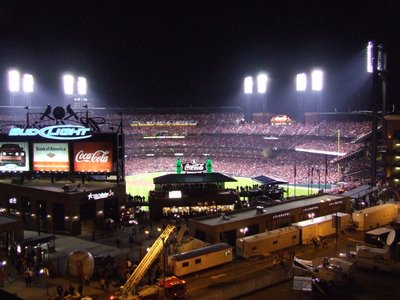The Eve of All Saints Day, All Hallows Even, Hallowe'en, is now, and always has been a Catholic popular observance. Whereas November 1st, All Saints Day, commemorates the souls in Heaven, and All Souls Day, November 2nd, commemorates the departed undergoing purification, October 31st is, in part, the unofficial holiday of remembrance of the souls of the damned in Hell, and how they got there.
Just because the holiday has some elements that derive from the pagan past is not necessarily a problem. This very article, after all, is written in the language derived from the pagan Anglo-Saxons, as is the King James Bible. Our current American Halloween customs started as a mixture of Irish and French Catholic popular customs regarding the dead, and is tied specifically to the celebration of All Saints Day.
"Trick or Treat" is the perhaps the most historically noxious part of Halloween, since it is a kind of extortion. Fortunately, most children don't understand this, and don't retaliate against those who fail to offer treats.
The Directory on Popular Piety and the Liturgy: Principles and Guidelines is a good contemporary document for helping us get to a proper understanding of Halloween, in sections 256-260, The Memorial of the Dead in Popular Piety. For Catholics, this celebration should be closely tied to the liturgy of the season, and must always be done in the light of the Faith. Even for other Christians, an understanding of the historical Catholic patrimony can be used as a guide for the proper understanding of Halloween. In all circumstances, occult practices should be avoided, and this is a central doctrine of nearly all Christians everywhere.
But Halloween also has a universal character, and can powerfully counter the current sanitization of death and denial of evil in our culture. But sadly, Halloween is becoming yet another expensive consumer holiday, and is just another excuse for drunken revelry.
Pages
▼
Tuesday, October 31, 2006
Monday, October 30, 2006
Photos of Saint Agatha Church, in Saint Louis, Missouri
Here are photos of Saint Agatha church, in Saint Louis, Missouri, located about three miles southwest of the Old Cathedral in downtown, and about a half mile from the banks of the Mississippi River.
Click here for my newer photos of the church.
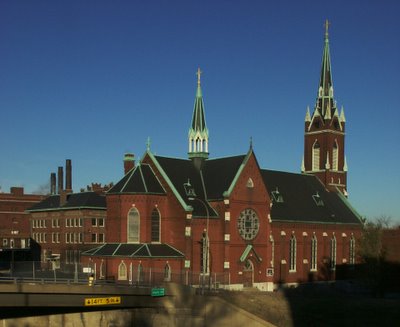
Saint Agatha's is located next to Interstate 55, and is just south of the Anheuser-Busch brewery, seen here in the background left. As this church has a very small natural parish, it is now home to the Polish-language apostolate. For many years, this was the location for the Archdiocesan's Indult Latin Mass.
I took this first photo in November, 2005. The rest were taken on October 29th, 2006.
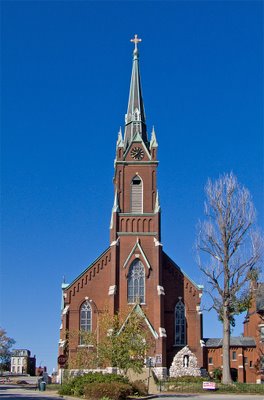
The parish dates from 1871; the church from 1885.
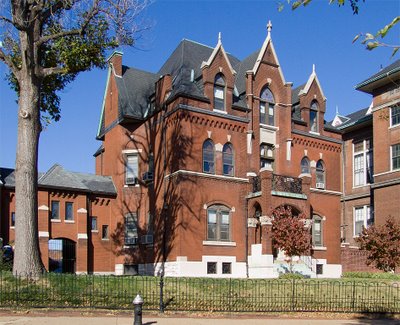
The rectory dates from 1896.
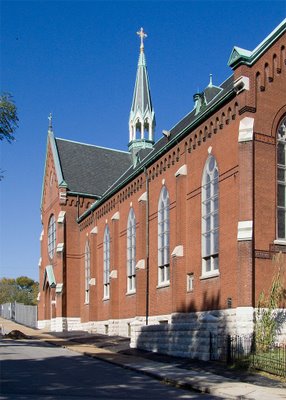
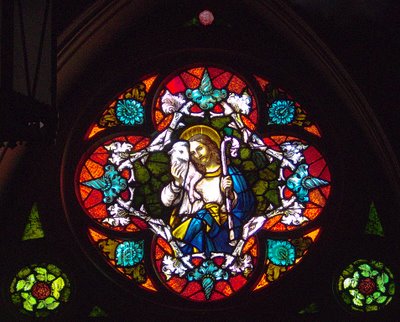
Window of Christ as the Good Shepherd, over the "Western", or main doors.
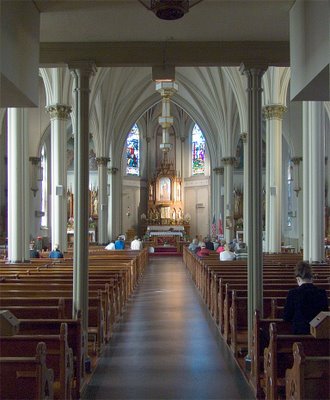
Nave of the church.
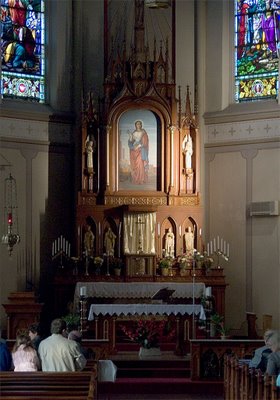
The altar, featuring a painting of the patroness, Saint Agatha, a 3rd-century martyr.
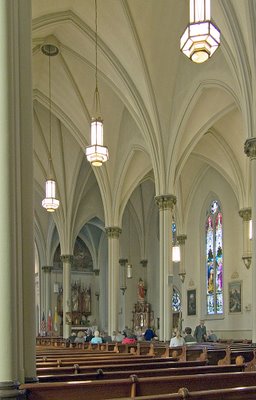
About ten minutes before Mass. Parishioners were saying the Rosary in Polish.
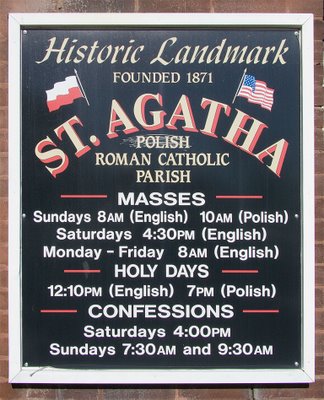
Masses:
Sundays 8AM (English) 10AM (Polish)
Monday-Friday 8AM (English)
Holy Days 12:10PM (English) 7PM (Polish)
Confessions:
Saturdays 4:00PM
Sundays 7:30AM and 9:30AM
Archdiocesan web site: http://www.archstl.org/parishes/127.shtml
Address:
3239 S. 9th Street
St. Louis, MO 63118
Click here for my newer photos of the church.

Saint Agatha's is located next to Interstate 55, and is just south of the Anheuser-Busch brewery, seen here in the background left. As this church has a very small natural parish, it is now home to the Polish-language apostolate. For many years, this was the location for the Archdiocesan's Indult Latin Mass.
I took this first photo in November, 2005. The rest were taken on October 29th, 2006.

The parish dates from 1871; the church from 1885.

The rectory dates from 1896.


Window of Christ as the Good Shepherd, over the "Western", or main doors.

Nave of the church.

The altar, featuring a painting of the patroness, Saint Agatha, a 3rd-century martyr.

About ten minutes before Mass. Parishioners were saying the Rosary in Polish.

Masses:
Sundays 8AM (English) 10AM (Polish)
Monday-Friday 8AM (English)
Holy Days 12:10PM (English) 7PM (Polish)
Confessions:
Saturdays 4:00PM
Sundays 7:30AM and 9:30AM
Archdiocesan web site: http://www.archstl.org/parishes/127.shtml
Address:
3239 S. 9th Street
St. Louis, MO 63118
Sunday, October 29, 2006
Upcoming Events at the Oratory
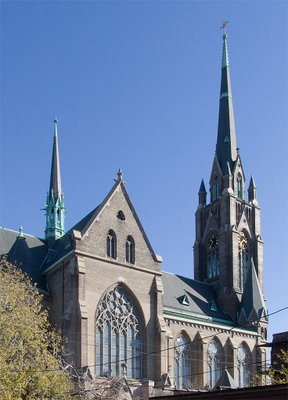
Here are some special events in November at Saint Francis de Sales Oratory, in Saint Louis, Missouri, local home of the Institute of Christ the King Sovereign Priest, which is one of the three locations in the area that offers the Indult Latin Mass.
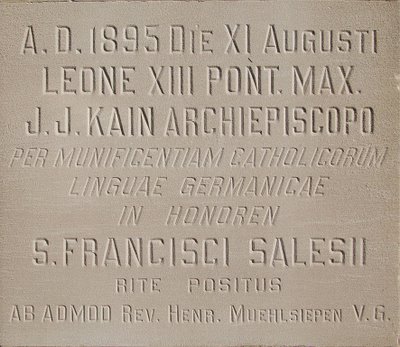
Vigil of All Saints: 7 pm, Solemn Rosary with Benediction.
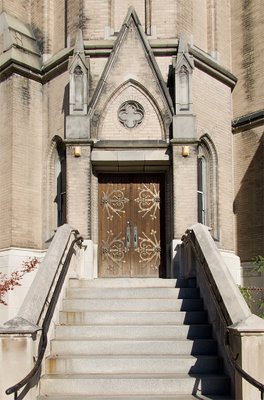
All Saints Day: Masses at 8 am and 12:10 pm; Solemn High Mass at 7 pm. Holy Day of Obligation.

All Souls Day: Masses at 8 am and 12:10 pm; Solemn Requiem Mass at 7 pm. Plenary indulgence for the departed under the usual conditions.
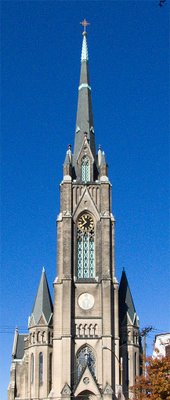
November 3rd: First Friday Solemn High Mass and Benediction at 7 pm.

November 19th: Benevolent Society breakfast after 8 am Mass.
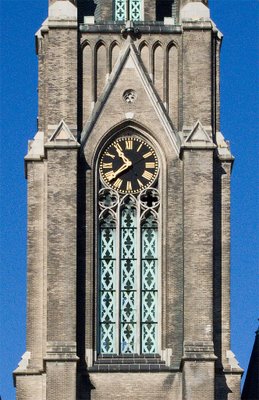
Thanksgiving Day: Proceeds from Mass to benefit the St. Vincent de Paul Society.
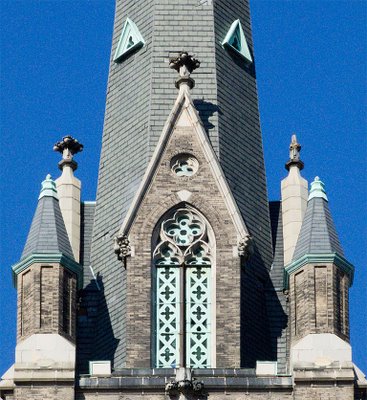
November 26th: Feast of the Dedication of the Oratory; Solemn High Mass 10 am.
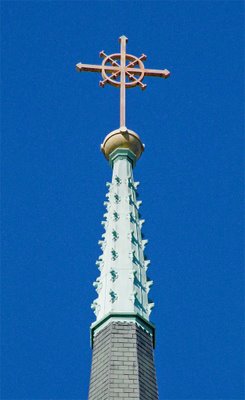
November 29th: Novena to the Immaculate Conception begins; daily Mass at 7 pm with sermon at the Altar of our Lady.

Feast of Christ the King
Today, under the old calendar, is the Feast of the Kingship of Our Lord Jesus Christ. Under the new calendar, the feast is on the last Sunday in Ordinary Time, or November 26th this year.
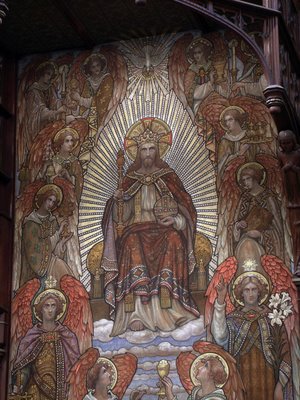
Tapestry of Christ the King, at Saint James the Greater church, in Saint Louis.
Piux XI promulgated the feast in 1925, to combat the totalitarian Communist, radical Secularist, and Fascist regimes that denied the Faith, as well as the spirit of anarchy and revolution. From his encyclical Quas primas:

Tapestry of Christ the King, at Saint James the Greater church, in Saint Louis.
Piux XI promulgated the feast in 1925, to combat the totalitarian Communist, radical Secularist, and Fascist regimes that denied the Faith, as well as the spirit of anarchy and revolution. From his encyclical Quas primas:
"When once men recognize, both in private and in public life, that Christ is King, society will at last receive the great blessings of real liberty, well-ordered discipline, peace and harmony. Our Lord's regal office invests the human authority of princes and rulers with a religious significance; it ennobles the citizen's duty of obedience. It is for this reason that St. Paul, while bidding wives revere Christ in their husbands, and slaves respect Christ in their masters, warns them to give obedience to them not as men, but as the vicegerents of Christ; for it is not meet that men redeemed by Christ should serve their fellow-men. "You are bought with a price; be not made the bond-slaves of men." If princes and magistrates duly elected are filled with the persuasion that they rule, not by their own right, but by the mandate and in the place of the Divine King, they will exercise their authority piously and wisely, and they will make laws and administer them, having in view the common good and also the human dignity of their subjects. The result will be a stable peace and tranquillity, for there will be no longer any cause of discontent. Men will see in their king or in their rulers men like themselves, perhaps unworthy or open to criticism, but they will not on that account refuse obedience if they see reflected in them the authority of Christ God and Man. Peace and harmony, too, will result; for with the spread and the universal extent of the kingdom of Christ men will become more and more conscious of the link that binds them together, and thus many conflicts will be either prevented entirely or at least their bitterness will be diminished."
Saturday, October 28, 2006
The Peril of Beauty
See the article: Why I Hate Beauty.
In years past, societies had good strategies to avoid this problem: modesty in dress, controlled dating, censorship of pornograhy, and single-sex high schools and colleges.
As the head of a public relations agency, I work with these women day and night. You might expect that to make me feel good, as we normally like being around attractive people. But my exposure to extreme beauty is ruining my capacity to love the ordinarily beautiful women of the real world, women who are more likely to meet my needs for deep connection and partnership of the soul.The author complains that his constant exposure to beautiful Hollywood actresses has ruined his ability to date everyday women, while those actresses ironically have poor self-evaluation of their own beauty.
In years past, societies had good strategies to avoid this problem: modesty in dress, controlled dating, censorship of pornograhy, and single-sex high schools and colleges.
Photos of Saints Peter and Paul Church, in Waterloo, Illinois
Here are photos of Saints Peter and Paul church, in Waterloo, Illinois, located about 23 highway miles south of downtown Saint Louis, Missouri. The church is in the Diocese of Belleville, which covers southern Illinois.
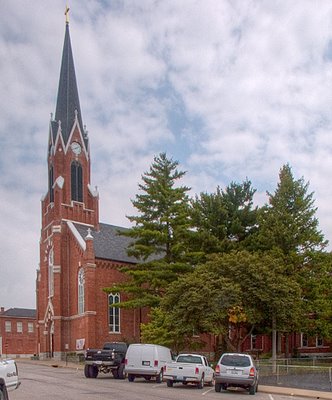
The church was completed in 1883, and at the time, was one of the largest churches in the then-Diocese of Alton.
These photos were taken on August 31st.
Waterloo is the county seat of Monroe County. This was the site of the Bellefontaine settlement, the first permanent Anglo-American community in the Northwest Territory, which was gained by the United States in 1783 from Britain after the Revolutionary War. Bellefontaine merged with Peterstown to the north to become Waterloo in 1818, named after the defeat of Napolean Bonaparte at Waterloo, Belgium, in 1815.
The northern part of Monroe County is rapidly becoming a suburb of Saint Louis, while Waterloo, although growing quickly, has many historic buildings near the church.
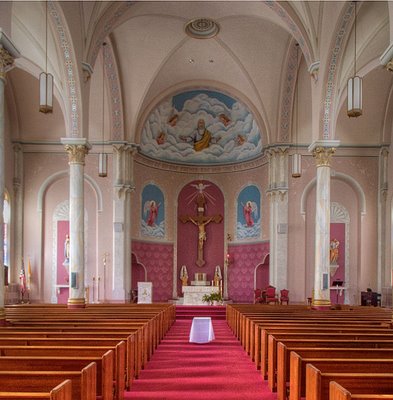
The parish website has an unusually detailed description of the symbolism here.
Prior to 1849, the area was ministered by Jesuits from Saint Louis; later Irish, and then German priests were in residence in Waterloo.
Click here for an early history of this church.
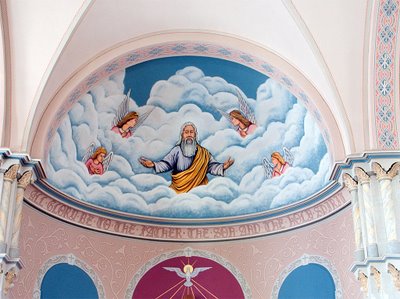
Click here for old sanctuary photos.
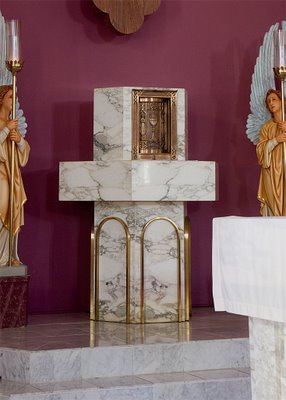
The tabernacle.
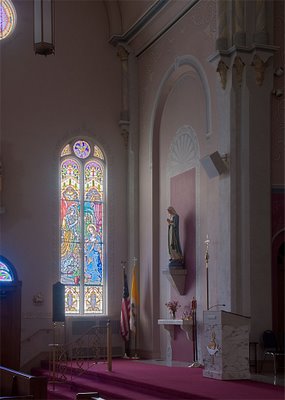
Blessed Virgin Mary.
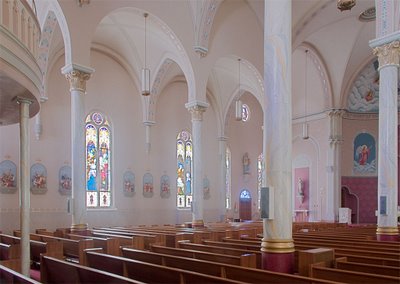
The newest stained glass window commemorates the Martyrs of Ruma, killed in Libera in 1992.
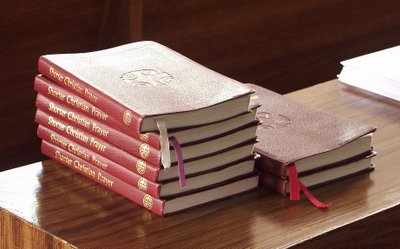
A pile of breviaries. The lay recital of the Liturgy of the Hours is rare in parishes, but praying the Psalms was a widespread practice in centuries past.
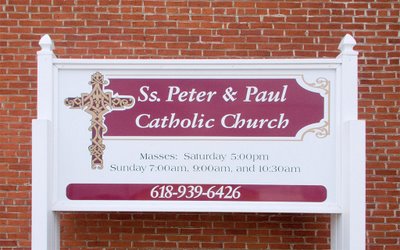
Masses: Saturday 5:00pm
Sunday 7:00am, 9:00am, 10:30am
Address:
204 West Mill Street
Waterloo, Illinois 62298

The church was completed in 1883, and at the time, was one of the largest churches in the then-Diocese of Alton.
These photos were taken on August 31st.
Waterloo is the county seat of Monroe County. This was the site of the Bellefontaine settlement, the first permanent Anglo-American community in the Northwest Territory, which was gained by the United States in 1783 from Britain after the Revolutionary War. Bellefontaine merged with Peterstown to the north to become Waterloo in 1818, named after the defeat of Napolean Bonaparte at Waterloo, Belgium, in 1815.
The northern part of Monroe County is rapidly becoming a suburb of Saint Louis, while Waterloo, although growing quickly, has many historic buildings near the church.

The parish website has an unusually detailed description of the symbolism here.
Prior to 1849, the area was ministered by Jesuits from Saint Louis; later Irish, and then German priests were in residence in Waterloo.
Click here for an early history of this church.

Click here for old sanctuary photos.

The tabernacle.

Blessed Virgin Mary.

The newest stained glass window commemorates the Martyrs of Ruma, killed in Libera in 1992.

A pile of breviaries. The lay recital of the Liturgy of the Hours is rare in parishes, but praying the Psalms was a widespread practice in centuries past.

Masses: Saturday 5:00pm
Sunday 7:00am, 9:00am, 10:30am
Address:
204 West Mill Street
Waterloo, Illinois 62298
Friday, October 27, 2006
Photo of Old Missouri State Capitol Building, in Saint Charles, Missouri

This is the first Missouri State Capitol building, located in Saint Charles, Missouri. It served as the capitol from 1821 to 1826, when the government relocated to Jefferson City. Previously, the Missouri Territory was governed from Saint Louis.
Saint Charles is located across the Missouri River from Saint Louis County, and was founded in 1765 by French-Canadian furtrapper Louis Blanchette, who served as the local district commandant for the Spanish Empire.
Submit a Website
If you would like to submit a website for inclusion on Rome of the West, Click here. You can also rate previously submitted websites. There is also a link to this on the sidebar to the right.
New Poll
See the sidebar on the right for a new poll on vocations: Are you considering a vocation to the Roman Catholic clergy or consecrated religious life?
You can scroll to the bottom of the pop-up window and add comments to the poll if you wish.
Here the results of the last poll:
You can scroll to the bottom of the pop-up window and add comments to the poll if you wish.
Here the results of the last poll:
What are your favorite architectural styles of churches?Quiz takers could vote for more than one category.
Gothic 27%
Byzantine 16%
Traditional 11%
Baroque 11%
Romanesque 11%
Classical 8%
Russian Orthodox 7%
Art Deco 3%
Colonial Revival 2%
Contemporary 1%
Modernist 1%
Other 1%
Postmodern (no votes)
None (no votes)
Green Comet
See the article: Wow! Striking Green Comet Suddenly Visible in Evening Sky
What had been a modest comet seen only with binoculars or telescopes flared up this week to become visible to the naked eye [images].P.S. And last night we missed a total eclipse of the moon, due to heavy overcast weather.
Comet Swan, as it is called, is in the western sky after sunset from the Northern Hemisphere. It remains faint, likely not easy to find under bright city lights but pretty simple to spot from the countryside.
Thursday, October 26, 2006
Photos of Most Sacred Heart Church in Florissant, Missouri
Here are photos of Most Sacred Heart Church, in Florissant, Missouri, which is about 17 highway miles northwest of downtown Saint Louis.
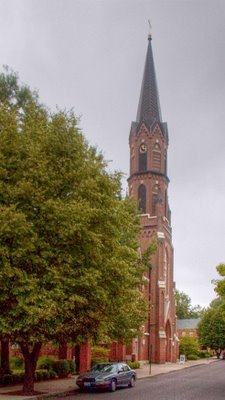
The parish is located in the Old Town section of Florissant. This town was one of the earliest French settlements in Missouri, and built its first church in 1788.
These photos were taken in August with my old camera, which had various problems, including fuzzy optics and bad color.

View from the side.
An influx of immigrants from Germany in the 1840s, as well as increasing numbers of Irish and English-speaking settlers, eventually required the construction of a new church. Originally, this area was in the parish of old St. Ferdinand's.
According to the 2006 census, this parish has approximately 4,566 Catholics. It also has a surprisingly large number of organizations.
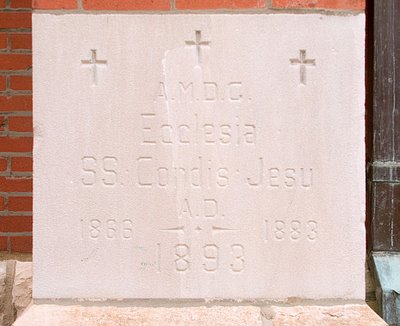
A.M.D.G
Ecclesia
SS. Corids Jesu
A.D.
1866 - 1883
1893
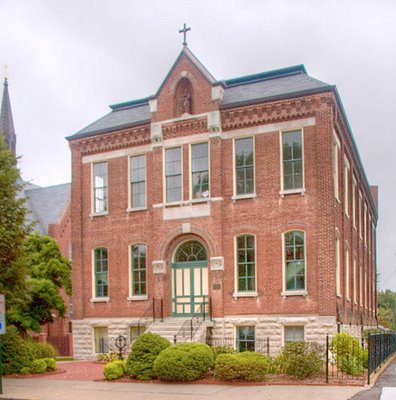
The old school building. Above the door is "HERZ JESU SCHULE 1889". This was once a German language parish.
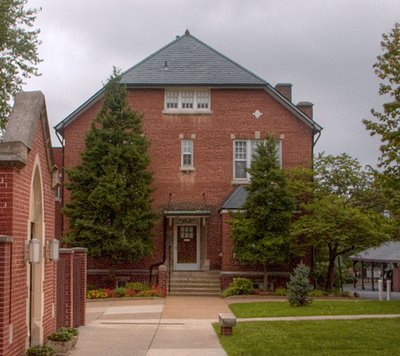
The rectory.
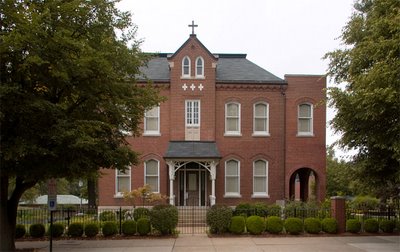
This is, I think, the convent. I saw a nun in full habit inside of the church.
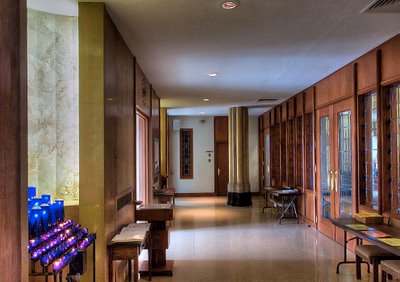
View of the narthex. It appears that this church had a major interior renovation in the late 1950s or early 1960s.
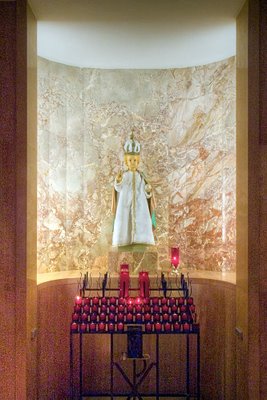
Infant Jesus devotion.
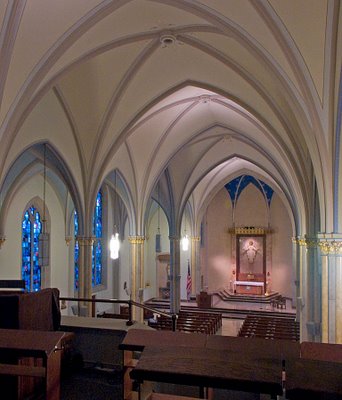
View of nave from the choir loft. Exposition was going on at the time of these photos.
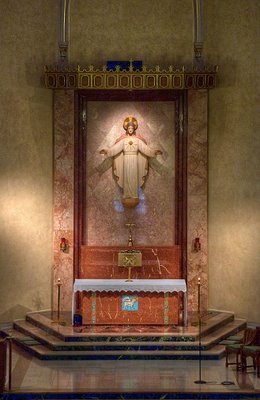
High altar, with monstrance.
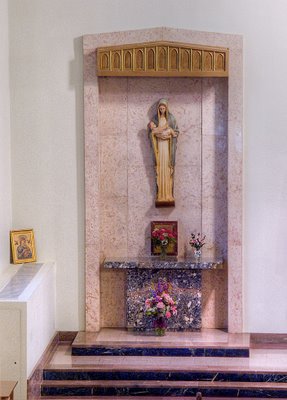
Altar of the Blessed Virgin Mary.
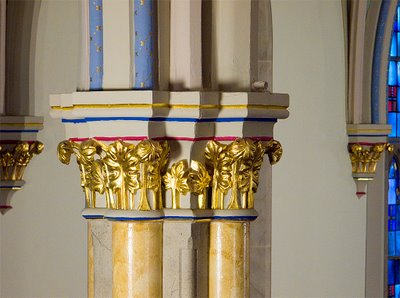
Detail of painting on columns.

Stained glass window, as seen from the choir loft.
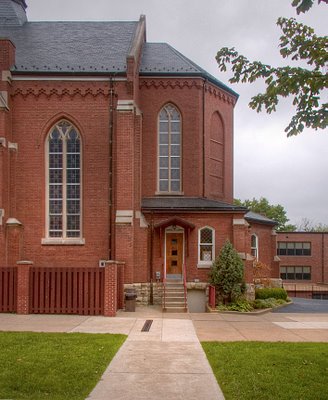
Door into the sacristy. To the background on the right is the new school building.

Flowers in the church's garden. Photos taken on August 29th.
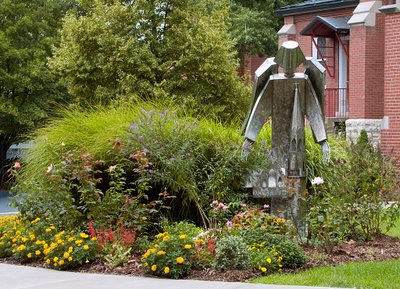
The sculpture is called "Clare's Angel", named after a beloved caretaker of the rectory.
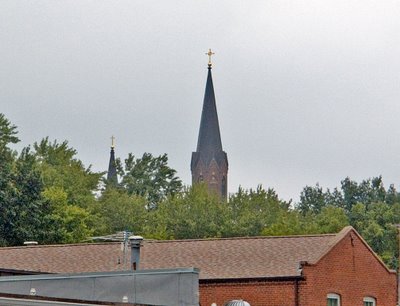
The church sits on the top of a hill, and its steeples are visible from quite a distance.
Mass times:
Monday-Friday: 7 AM, 8 AM
Saturday: 7 AM, 5 PM (Sunday vigil)
Sunday: 7 AM, 9 AM, 10:30 AM, Noon
Confessions:
Saturday: 9 AM, 3:30 PM - Until all are heard
Eucharistic Adoration:
Monday-Friday: All Day (the parish also has a Nocturnal Adoration Society)
Address:
751 North Jefferson Street
Florissant, Missouri 63031

The parish is located in the Old Town section of Florissant. This town was one of the earliest French settlements in Missouri, and built its first church in 1788.
These photos were taken in August with my old camera, which had various problems, including fuzzy optics and bad color.

View from the side.
An influx of immigrants from Germany in the 1840s, as well as increasing numbers of Irish and English-speaking settlers, eventually required the construction of a new church. Originally, this area was in the parish of old St. Ferdinand's.
According to the 2006 census, this parish has approximately 4,566 Catholics. It also has a surprisingly large number of organizations.

A.M.D.G
Ecclesia
SS. Corids Jesu
A.D.
1866 - 1883
1893

The old school building. Above the door is "HERZ JESU SCHULE 1889". This was once a German language parish.

The rectory.

This is, I think, the convent. I saw a nun in full habit inside of the church.

View of the narthex. It appears that this church had a major interior renovation in the late 1950s or early 1960s.

Infant Jesus devotion.

View of nave from the choir loft. Exposition was going on at the time of these photos.

High altar, with monstrance.

Altar of the Blessed Virgin Mary.

Detail of painting on columns.

Stained glass window, as seen from the choir loft.

Door into the sacristy. To the background on the right is the new school building.

Flowers in the church's garden. Photos taken on August 29th.

The sculpture is called "Clare's Angel", named after a beloved caretaker of the rectory.

The church sits on the top of a hill, and its steeples are visible from quite a distance.
Mass times:
Monday-Friday: 7 AM, 8 AM
Saturday: 7 AM, 5 PM (Sunday vigil)
Sunday: 7 AM, 9 AM, 10:30 AM, Noon
Confessions:
Saturday: 9 AM, 3:30 PM - Until all are heard
Eucharistic Adoration:
Monday-Friday: All Day (the parish also has a Nocturnal Adoration Society)
Address:
751 North Jefferson Street
Florissant, Missouri 63031
Conference with Dr. Alice Von Hildebrand
Catholic Lecture Series
Speakers: Roy H. Schoeman, Dr. Alice von Hildebrand,
Dr. Alice von Hildebrand, and William J. Federer
and William J. Federer
Date: Saturday, November 11, 2006
Time: 8:30 am – 4:30 p.m.
Where: Old St. Ferdinand Shrine
1 Rue Saint François
Florissant, Missouri 63031
The church is 17 highway miles northwest of downtown Saint Louis. Click for photos of Old Saint Ferdinand Shrine.
Lunch available for $5.00
Includes: Holy Mass and optional tour of Old St. Ferdinand Shrine
(Home to St. Phillipine Duchesne).
If you have any questions, call Lu at 714-473-7980.
—courtesy of Tom Leith.
Speakers: Roy H. Schoeman,
Date: Saturday, November 11, 2006
Time: 8:30 am – 4:30 p.m.
Where: Old St. Ferdinand Shrine
1 Rue Saint François
Florissant, Missouri 63031
The church is 17 highway miles northwest of downtown Saint Louis. Click for photos of Old Saint Ferdinand Shrine.
Lunch available for $5.00
Includes: Holy Mass and optional tour of Old St. Ferdinand Shrine
(Home to St. Phillipine Duchesne).
If you have any questions, call Lu at 714-473-7980.
—courtesy of Tom Leith.
Wednesday, October 25, 2006
Tuesday, October 24, 2006
Photo of All Saints Church in University City, Missouri
This is a photo of All Saints Church, in University City, Missouri, located about nine highway miles northwest of downtown Saint Louis. The parish dates from 1901.
UPDATED: Click here for more photos.

Address:
6403 Clemens Avenue
Saint Louis, Missouri 63130
UPDATED: Click here for more photos.

Address:
6403 Clemens Avenue
Saint Louis, Missouri 63130

